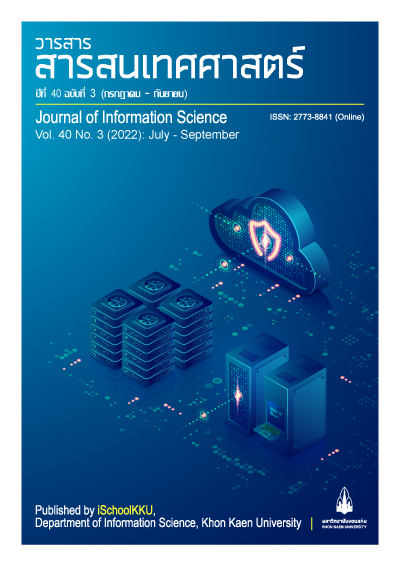The Operations of Board Game Services and Users' Behavior in Academic Libraries
DOI:
https://doi.org/10.14456/jiskku.2022.19Keywords:
Board game, Tabletop, Educational board game, Board game serviceAbstract
Purpose: This study examines the board game service engagement and users’ behavior in using the service in academic libraries for supporting their learning.
Methodology: This research is divided into 2 stages. Stage one is a qualitative investigation gathering data through the interviews with responsible board game service staffs of the academic libraries. In stage two, questionnaires are used for quantitative data collection.
Findings: The analysis of the collected data reveals that the majority of academic libraries possess board game service policies; no structural organization of the service exists and no working unit is assigned to be responsible for the service implementation; and the game service operation process is similar to that of other library resources in terms of acquisition, organization, classification and cataloging system. With regard to the board game service location, it was found that the board game service areas are either arranged in a separate space or shared with other service divisions. In addition, the board game service provision in general is similar to the other library services in that there are staffs for providing the service. Users are allowed to play the board games in the library and no single game can be checked out. The analysis of the game users’ behavior indicates that they play the board games for pleasure and mainly for tension relief; the maximum number of their use experience is 1 – 3 times; they often use the game service when they have no class schedule and their favorite games are party games. As for the factors which impact the board game service, service areas and facilities are found to have the greatest impact toward the service usage.
Applications of this study: Findings from this study can be applied in the board game service quality development in a library to meet its user needs.
Downloads
References
American Library Association. (2014). Tabletop. Retrieved 1 January 2021, from http://www.ala.org/rt/gamert/tabletop
Andy, Y. (2016). Can board games improve staff performance? Retrieved 22 February 2021, from https://www.learnevents.com/blog/2016/08/30/can-boardgames-improve-staff-performance/
Berland, M., & Lee, V. (2011). Collaborative strategic board games as a site for distributed computational thinking. International Journal of Game-Based Learning, 1(2), 65-81.
Eakthanyawong, P. (2019). Factors influencing satisfaction with board game cafe service in the Bangkok metropolitan area (In Thai). Master thesis in independent study in Business Administration, Thammasat University.
Hvinden, A. (2019). So you are looking to start your library board game program. Retrieved 3 May 2021, from https://games.ala.org/so-you-are-looking-to-start-your-library-board-game-program/
Krejcie, R. V., & Morgan, D. W. (1970). Determinig sample size for research activities. Educational and Psychological Measurement, 30(3), 607-610.
Limpremwattana, V., & Thamwattann, K. (2017). Behavior of playing board games and component of effective factors for playing games of teenagers in the Bangkok. Journal of Social Research, 40(2), 107-132.
Pappas, J. (2013). Board in the library, part one. Retrieved 2 June, from https://www.webjunction.org/news/webjunction/board-in-the-library-part-one.html
Pasunon, P. (2014). Reliability of questionnaire in quantitative research. (In Thai). Parichart Journal, 27(1), 144-163.
Puttarangsi, R. (2017). Application of board games for performing arts communication skill development (In Thai). Master Thesis in Communication Arts, Chulalongkorn University.
Ransibrahmanakul, A. (2019). Customer behavior in using services at Lanlalen board game cafe. (In Thai). Retrieved 20 July, from https://mmm.ru.ac.th/MMM/IS/twin-6/sec2/6014154048.pdf
Retalis, S. (2008). Creating adaptive e-learning board games for school settings using the ELG environment. Journal of Universal Computer Science, 14(17), 2897–2908.
Sae-ung, K., Romchit, N., Kaewprateep, P., Kongchan, T., Nakanuan, W., & Batpimai, S. (2016). Study of online gaming behavior of students at Nakhonratchasima Rajabhat University. (In Thai). Nakhonratchasima: Nakhonratchasima Rajabhat University.
Saechia, T. (2017). Using strategy-based board games to develop the critical thinking skills of 9th grade students in large-sized schools of the basic education commission of PathumThani. (In Thai). Master Thesis in Learning Sciences and Educational Innovation, Thammasat University.
Silverman, D. (2013). How to learn board game design and development. Retrieved 4 May 2021, from https://gamedevelopment.tutsplus.com/articles/how-to-learn-board-game-design-and-development--gamedev-11607
Slobuski, T., Robson, D., & Bentley, P. J. (2017). Arranging the pieces: a survey of library practices related to a tabletop game collection. Retrieved 3 June 2021, from https://journals.library.ualberta.ca/eblip/index.php/EBLIP/article/view/27785/21244
Swiatek, C., & Gorsse, M. (2016). Playing games at the library: seriously?. Retrieved 3 June 2021, from https://www.liberquarterly.eu/articles/10.18352/lq.10161/
Thailand Knowledge Park. (2015). Thinking in time: challenging the paradigm of the future of libraries and learning in the 21 century. (In Thai). Bangkok: Thailand Knowledge Park.
Treher, E. N. (2011). Learning with board games: tools for learning and retention. Retrieved 4 April 2021, from https://www.thelearningkey.com/pdf/Board_Games_TLKWhitePaper_May16_2011.pdf








